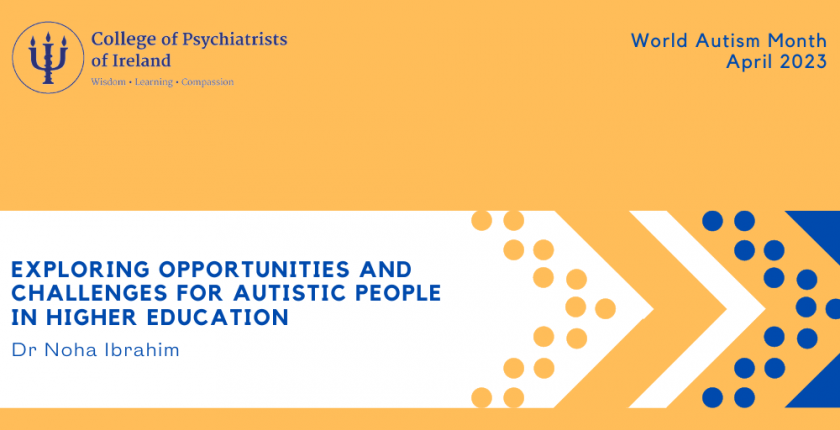Blog
World Autism Month 2023: Exploring Opportunities and Challenges for Autistic People in Higher Education
- April 17, 2023
- Posted by: ICP
- Category: Blog External Affairs & Policy Of interest from media Public Information Stakeholders

Dr Noha Ibrahim examines the challenges facing autistic students at 3rd level, and looks further at the opportunities to address the experiences and outcomes for this population in higher education.
In recent years, universities have become more aware of the number of neurodiverse students, including autistic students, attending higher education[1, 2]. We know neurodiverse undergraduates will grow into neurodiverse professionals and therefore it is important to address their experience in higher education and enable a smooth transition to career and working life[3].
Neurodiverse students are considered “twice-exceptional” whereby universities look to support any challenges they experience while celebrating their innate strengths within the classroom[4].
Potential Challenges encountered by Autistic Students in Higher Education:
A. Features of Autism
Inherently, an autistic student would show difficulties related to their reciprocal communication deficits, their rigid interests and strict repetitive routines and behaviours that might negatively affect their academic and social experience in higher education. Other than the main features of autism, associated comorbidities including intellectual disability, anxiety, ADHD and other mental and physical health problems, all of which can further negatively impact their academic performance. It is well known that the executive functioning of an autistic brain – features such as planning, fluency, concept formation, memory and mental flexibility – is different in comparison to a “neurotypical” brain, widening the gap when it comes to understanding their needs[5].
B. Transition to Higher Education
Unfortunately, and despite support set in place by universities, autistic students’ outcomes in post-secondary education are stark in comparison to non-autistic school students [6]. This is possibly attributed to the fact that unlike schools, where supports for students with learning needs are integrated into the learning environments, it is the individual student’s responsibility to contact the disability services in postsecondary education [7]. Additionally, many factors including stigma, social and academic needs of neurodiverse students and institutions’ financial deficiencies can result in a sobering experience for neurodiverse students in higher education, despite support structures in place[8].
Strengths and Opportunities
A social stance argues that the deficit lies within the society’s lack of acceptance of autistic people, rather than the medical diagnosis. Surely, both medical and social views are valuable, and thanks to autism research pioneers, the literature has shifted its focus from looking at deficits, prevention and treatment of autism to highlighting strengths-based approaches to address autism needs[9]. While advantages are highly individualised, some common strengths that autistic people have are:
• Analytical, logical and systematic thinking
• Complex reasoning
• Attention to detail
• Enhanced visual perception
• Creativity
• Honesty and dedication
• Ability to work independently
Exploring Solutions
A. Legislation
In recent decades, higher education has moved in a more inclusive direction for neurodiverse students, through legislation and the establishment of supports within higher education institutions. The 1970s marked the dawn of equality legislation in many European states, including Ireland[10], and equality and inclusion have since expanded, particularly with the now well established Athena Scientific Women’s Academic Network (SWAN)[11]. At this time, the Equal Status Act in Ireland promotes against discrimination and calls for reasonable accommodations for all to be in place. However, this presents with a degree of ambiguity, as it is left to the institute to decide what are the ‘reasonable accommodations’ they can provide within their resources [12].
B. Accommodation within Higher Education Institutes
While autistic people are capable of meeting the requirements of enrolment in colleges and universities, instrumental strategies are required to address their diverse needs when there. The first step for supporting autistic students is to identify them – however, this step remains a challenge largely due to stigma[13] and informal pathways of identification[7]. There are different academic, technical and environmental supports that has been suggested in the literature[8, 14], Here are some examples of valuable interventions and supports:
- Simple academic strategies supporting autistic students, and other learners, including chunking of their tasks, and giving clear expectation for the required tasks[15].
- A social skills program provided for first year students with autism, providing a space for students to express their concerns with transitioning to college and learn social skills to help their interactions with their peers, their campus and the available services[16].
- A guided peer support group program reviewing the anticipated academic and social challenges and developing strategies to address these challenges[17].
- Bridges Graduate School of Cognitive Diversity in Education, a specialised institute was implemented in 2019 for post-secondary education accepting multiple international students with diverse learning needs [18].
C. Research And Funding
Scarcity in evidence describing the experience of college students with autism in higher education has been reported [14], along with inadequate funding[19], and good understanding of the needs for autistic people transitioning to adulthood. Knowledge and implementation of required supports for this group are needed[19].
Dr Noha Ibrahim is a Higher Specialist Trainee in General Adult Psychiatry and a member of the College of Psychiatrists of Ireland Autism Special Interest Group.
For more information on the CPsychI Autism Special Interest Group, click here.
